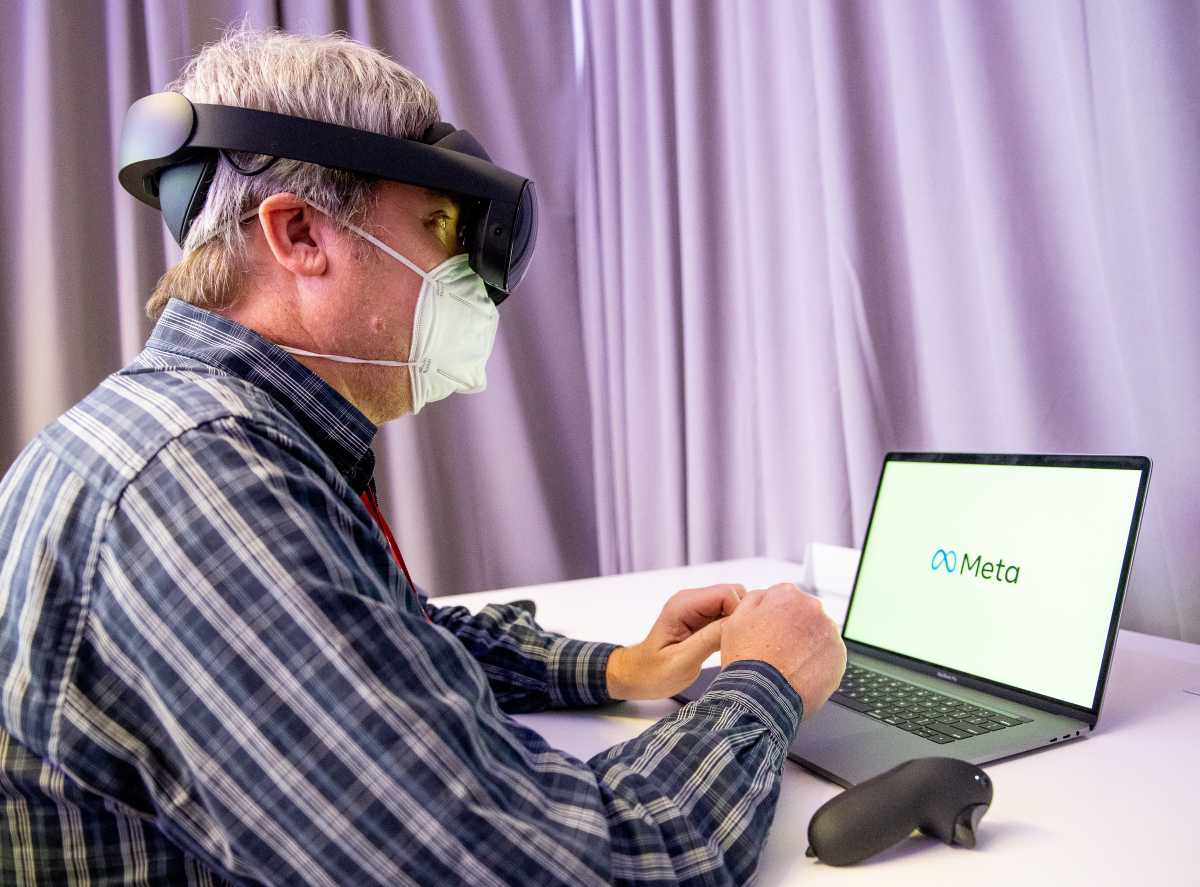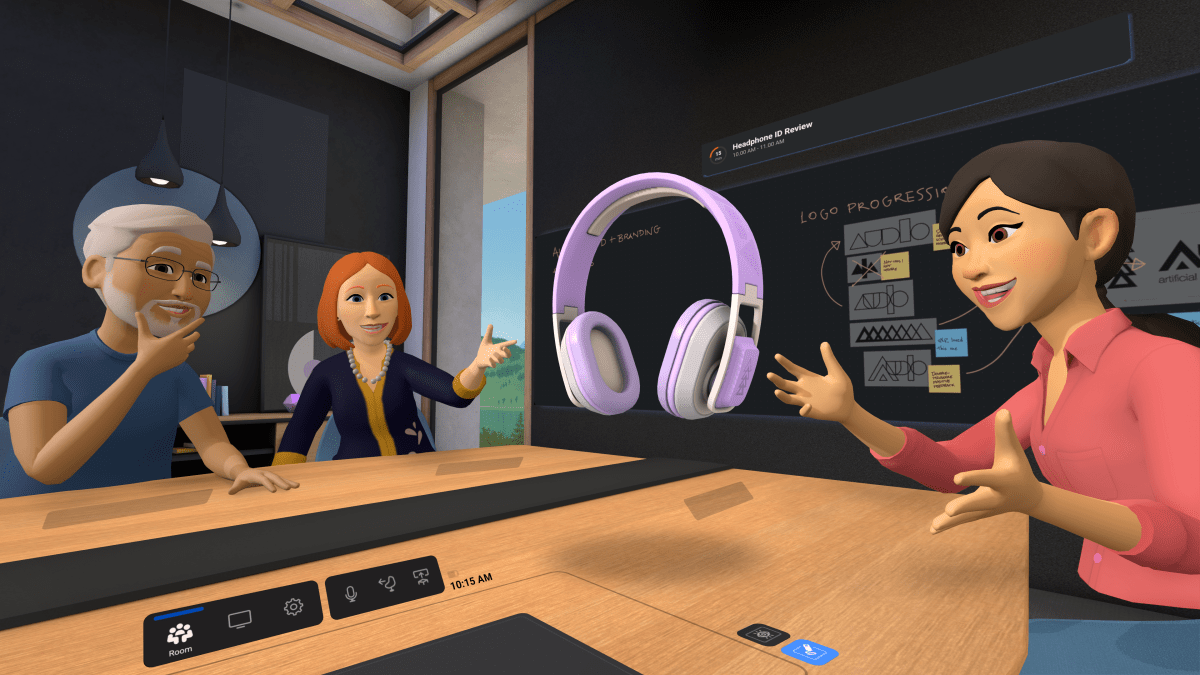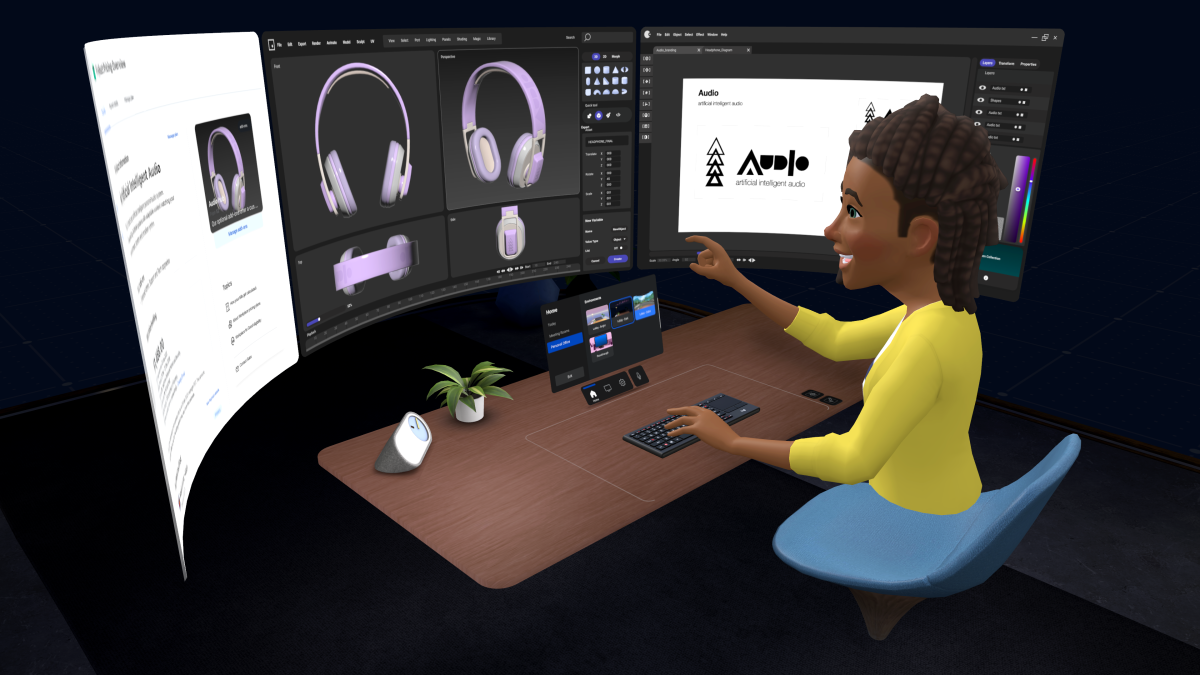It seems pretty obvious to anyone outside Mark Zuckerberg’s sphere of influence that the metaverse will be the parachute pants of the 2020s, the accessory for those who are “killing it” while hopscotching their way through a half-dozen failed startups.
So I was prepared to take the hatchet to Meta’s Horizon Worlds, the metaverse app that looked a lot like Ralph Breaks the Internet when it debuted last year. But the reality is that, Horizon Worlds — well, Horizon Workrooms, which is sort of a subset of Worlds — is a lot like Facebook. And it’s not entirely bad. Just mostly.
Meta originally launched Horizon Worlds as an app that was intrinsically tied to its VR headsets, specifically the Meta Quest 2. Today, Meta launches the Meta Quest Pro, an astronomically priced $1,500 “premium” standalone VR headset with a battery life of between one to two hours. Meta, I was told, wants to see which apps perform well in its enthusiast community, before trying to migrate them to its consumer audience of the Meta Quest 2 at large. Interestingly, it sees the Meta Quest Pro as a “productivity” solution, much in the way the Microsoft HoloLens 2 morphed into a productivity device.
At Meta’s headquarters, I was invited to try out the Meta Quest Pro in various scenarios. But I was as equally as interested in knowing if the Meta Quest Pro could be used as well in a productivity scenario as in an entertainment context…even if Meta employees have already decided not to use it. Weirdly, Horizon Workrooms and Worlds is a year old, and yet no one outside Facebook really knows what it is.
Horizon Worlds is attractive, but ultimately lacking
I’ll talk about what I thought of the Meta Quest Pro in a separate hands-on. But as for Horizon Workrooms, well, it’s Facebook.
I was asked to take part in a virtual “meeting” using the Meta Quest Pro. I sat down and was handed a headset, then launched the Horizon Workrooms app. My contact appeared virtually before me, seated at a desk. Unlike VRChat, Horizon Worlds’ chief competitor, Horizon and the Quest essentially just show you from the waist up — which is fine, generally, as you tend to focus on a person’s face and eyes. (Unfortunately, we weren’t allowed or able to capture what Horizon Workrooms looked like within VR.)

(Photographs by Bob Minkin for META)
The Meta representative ran through a few quick scenarios, including setting the meeting inside an office in a quasi-futuristic city, or in a room in a Greek island. Since the Meta Quest Pro is a standalone headset, with independent controllers that don’t depend on the headset for positioning, I was encouraged to physically walk around the space I was in, approaching a virtual whiteboard that I could draw on. (One of the Meta Quest Pro’s features is the ability to twist and then “draw” with a controller, like a stylus.)
Give credit where credit is due: Sitting across from another person, even virtually, felt more natural and lifelike than chatting on a video screen. The virtual “table” I was sitting at will “expand” if more people join, and there’s even breakout rooms. Spatial audio worked, sort of, letting me know who was speaking just by following the sound of their voice. Oh, and by the way, the graphics has definitely improved over the basic avatars that were mocked earlier this year, though they’re still nothing to write home about. (Again, Facebook denied our use of actual in-headset imagery.)

Meta
And that’s what you’d want. Let’s face it: Facebook began as a way to connect to friends and family, in both a university setting and later in the world at large.
But that’s where the illusion starts to fall apart.
The Meta Quest Pro has both user-facing and external cameras. One of the Meta Quest Pro’s selling points is that the face camera tracks 72 different points on your face, which is quite extraordinary — everything from tracking how wide your eyes are, whether your cheeks are puffed out, and so on. Interestingly, it takes a neutral view of your face — if you have a fat, round, face, or a long, narrow face, I was told that Meta tries to average out the differences, in the interest of not preserving physical deformities. If you’re grossly overweight in real life, you won’t be in Worlds, unless you choose to be. And that’s absolutely fine.
But you quickly realize, too, that in a business setting, you can’t really read the signals that tell you exactly what the other person is thinking. I don’t care to judge someone on how they look, but it’s important to me to know whether they’re invested, interested, slouching or bored. Worlds/Workrooms doesn’t tell you that. Is a person engaged and attentive? In real life or a Zoom call, you can probably tell. In Worlds, you’re going to have a much harder time.
In Worlds and Workrooms, then, actions and reactions are performative. Yes, there’s hand tracking, so you can wave your hands about or strike an exaggerated expression to communicate your feelings.

(Photographs by Bob Minkin for META)
But I was absolutely struck by how this mirrors Facebook in real life — people don’t post their true, everyday feelings, but their “wins,” accomplishments, and milestones. Workrooms seems much the same. In a world that seemingly craves authenticity, Worlds and Workrooms simply abstract the real world even more.
The virtual office isn’t better than a real one
The other demonstration I was eager to try was simply using the Meta Quest Pro inside of a business setting. Remember, Meta showed off a concept of a virtual “home office,” where the headset could be used to project an array of three virtual monitors where none existed. That’s a tantalizing proposition, especially on a business trip; that’s one reason we endorsed FOPO’s portable “triple display” that clips on to your laptop.
Again, the concept is sound. I was able to use the headset to create a “home office” environment (overlooking a virtual lake, in my case) and then connect the headset to an Apple Mac, which is like a Windows PC but more expensive.

Meta
Meta’s “office” works, but only if you give it some leeway. The displays it creates do a nice job displaying text — but only if the text size is manually increased to the point where you can’t see much per display. Each of the Meta Quest Pro’s displays outputs 1,920 x 1,800 at 90Hz per eye, with foveated rendering helping to resolve more pixels where your eyes are focused. That all sounds great on paper, but you can simply do more by using a high-resolution laptop monitor and either using virtual desktops or snapping windows to various corners. Put another way, any monitor can display text if you increase the font size large enough.
Meta’s Quest Pro headset does do one neat trick: it adds full-color passthrough, which can be carved out into zones. What this means is that the passthrough cameras optionally allow you to see around you in “real” space, in full color, so that you can interact with real-world objects. While the resulting image is indistinct and grainy, that doesn’t really matter — until you’re doing something that requires precision, such as typing on your physical keyboard but at your virtual desk.
So while Meta’s demo overlaid a virtual keyboard over the physical keyboard at the desk — which is weird, even in concept — the passthrough camera didn’t quite match up, either. My fingers were never quite sure that they were on the right keys, and that made me even more unsure than I would normally be on an unfamiliar keyboard. It just really didn’t work. And it didn’t help that either eyestrain or just some issues with the headset were starting to give me a headache and some nausea.
Isn’t it time to stop talking about the metaverse?
The question I was left asking myself was: Do I really need Meta’s virtual abstraction of the real world, when the real world exists? For entertainment, and art — I don’t know. But for business? And productivity? I have a hard time seeing it.
If Zuckerberg hadn’t changed his company’s name, terrifying competitors into at least paying lip service to the metaverse, would the metaverse really be a topic of serious conversation? I can absolutely appreciate the technical wizardry that went into the Meta Quest Pro, especially if we wave away its exorbitant price tag. Separate that from the whatever the metaverse is, and you can have a serious conversation.
But for business, Horizon Worlds just seems like another expensive toy for the Silicon Valley crowd to show off. And I really don’t have much use for that right now.
